Soros-Backed Manhattan DA Alvin Bragg Won’t Seek Prison Sentences for a Bunch of Crimes

Oh, look. Another new district attorney in a major city backed by billionaire George Soros wants to go soft on crime.
The New York Post’s Bob McManus described Alvin Bragg’s win to become Manhattan DA as “Soros’ biggest coup yet.”
Bragg took over on January 1. On January 4, Bragg promised to instill new rules similar to those in San Francisco and Philadelphia, both of which have DAs backed by Soros. Both cities are chaotic.
I guess Manhattan is next because Bragg wants his office to stop pursuing prison sentences for a bunch of crimes:
In his first memo to staff on Monday, Alvin Bragg said his office “will not seek a carceral sentence” except with homicides and a handful of other cases, including domestic violence felonies, some sex crimes and public corruption.“This rule may be excepted only in extraordinary circumstances based on a holistic analysis of the facts, criminal history, victim’s input (particularly in cases of violence or trauma), and any other information available,” the memo reads.Assistant district attorneys must also now keep in mind the “impacts of incarceration,” including whether it really does increase public safety, potential future barriers to convicts involving housing and employment, the financial cost of prison and the racial disparities over who gets time, Bragg instructed.
If a prosecutor wants to put someone behind bars they cannot request “more than 20 years for a determinate sentence, meaning one that cannot be reviewed or changed by a parole board.”
This means Bragg’s “Office shall not seek a sentence of life without parole.”
However: “In exceptionally serious cases such as homicides where lengthy periods of incarceration are justified, ADAs shall consider the use or restorative justice as a mitigating factor in determining the length of the sentence, only when victims or their loves ones consent.”
Bragg told his prosecutor that they have “a presumption of pre-trial non-incarceration for every case except” for severe crimes like homicide, public corruption, and a few others.
The office might make exceptions “in extraordinary circumstances.”
Look at the changes for those charged with armed robbery and burglars:
- Armed robbers who use guns or other deadly weapons to stick up stores and other businesses will be prosecuted only for petty larceny, a misdemeanor, provided no victims were seriously injured and there’s no “genuine risk of physical harm” to anyone. Armed robbery, a class B felony, would typically be punishable by a maximum of 25 years in prison, while petty larceny subjects offenders to up to 364 days in jail and a $1,000 fine.
- Convicted criminals caught with weapons other than guns will have those felony charges downgraded to misdemeanors unless they’re also charged with more serious offenses. Criminal possession of a weapon in the third degree, a class D felony, is punishable by up to 7 years behind bars.
- Burglars who steal from residential storage areas, parts of homes that aren’t “accessible to a living area” and businesses located in mixed-use buildings will be prosecuted for a low-level class D felony that only covers break-ins instead of for more serious crimes. Those more serious crimes, class B and class C felonies, would be punishable by up to 25 and up to 15 years in prison respectively.
- Drug dealers believed to be “acting as a low-level agent of a seller” will be prosecuted only for misdemeanor possession. Also, suspected dealers will only be prosecuted on felony charges if they’re also accused of more serious crimes or are actually caught in the act of selling drugs. That felony would mean facing up to seven years behind bars.
CLICK HERE FOR FULL VERSION OF THIS STORY